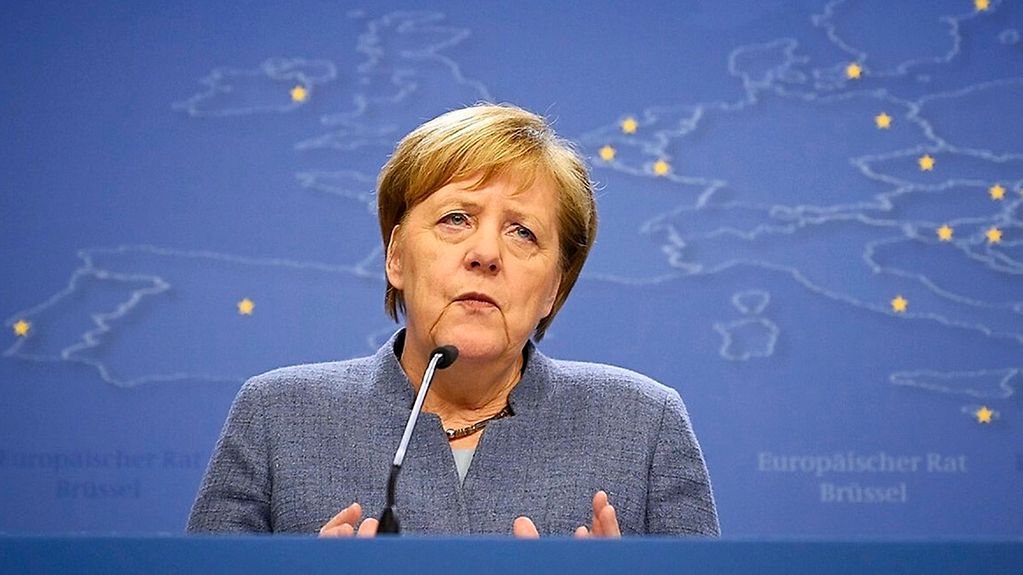European Council
One of the most important items on the agenda of the European Council meeting in Brussels was Brexit. On the controversial backstop for Northern Ireland, the Chancellor said that the aim is to establish relations between the European Union and the United Kingdom "in which each partner is free to develop". Leaders also mandated the Eurogroup to work on a budgetary instrument.

On Brexit Angela Merkel declared that the withdrawal agreement has been negotiated and will not be reopened.
Photo: Bundesregierung/Kugler
At the summit meeting, the EU leaders discussed the next steps regarding Brexit, after the vote on the withdrawal agreement in the House of Commons was postponed.
The Chancellor stressed, "For us it is important to have relations between the United Kingdom and the European Union in future, in which each partner is free to develop."
Brexit and Northern Ireland: the backstop is only an insurance policy
The EU-27 made it plain to British Prime Minister Theresa May "that the backstop is intended as an insurance policy, in case we do not manage to negotiate a final agreement on future relations before the end of the transition phase".
But Angela Merkel also stressed that the EU would not reopen the withdrawal agreement for negotiation. The agreement on the table "is the deal that was negotiated and that is the deal that we have".
The European Council reconfirmed its conclusions of 25 November 2018, in which it endorsed the withdrawal agreement and the political declaration on future relations. The Union stands by the agreement and intends to proceed with its ratification. It is not open for renegotiation.
Euro Summit: agreement on a budgetary instrument
At the Euro Summit that followed the European Council meeting on Friday, EU leaders agreed on a budgetary instrument for the Eurogroup. The Chancellor reported that the decision was based on Franco-German proposals.
The ministers of finance have now been asked to draw up proposals for a budgetary instrument. The aim is to strengthen competitiveness and foster convergence among member states, explained the Chancellor. It will be part of the EU budget.
On a voluntary basis, the budgetary instrument will also be open to countries that have not yet joined the euro, but are close to doing so.
Another important point discussed to strengthen Economic and Monetary Union was the further development of the European Stability Mechanisms (ESM). This is a tool that will enable the group to respond decisively to crises at an early stage.
EU citizens’ dialogues – important impetus for the future of the Union
The European Council also looked at the outcomes and conclusions of the citizens’ dialogues on the future of Europe. From the beginning of May to the end of October the dialogues were held in all member states with the exception of the United Kingdom.
The dialogues aimed to find out how the people of Europe see the EU in their day-to-day life and what their ideas are for the future of the European Union. A total of 1,500 dialogues were held – 120 in Germany alone. 150,000 people across Europe were involved.
Other items on the agenda of the summit
- The European Council expressed its utmost concern regarding the escalation at the Kerch Straits and the Sea of Azov and Russia’s violations of international law. It reconfirmed its commitment to international law, the sovereignty, territorial integrity and independence of Ukraine, and the EU’s policy of non-recognition of the illegal annexation of Crimean. The European Council advocated extending economic sanctions on Russia.
- The Single Market was another topic discussed. The Council intends to press ahead with the Single Market agenda and remove barriers to a smoothly functioning Single Market.
- Looking forward to the European elections at the end of May 2019, EU leaders addressed the problem of disinformation. The aim is to step up action against disinformation and attempts to influence voters.
- The European Council again looked at the implementation of the comprehensive approach to migration adopted at the European Council meeting in June. There was an exchange of views on the multiannual financial framework for the period 2021-2027. The aim is to come to an agreement at the European Council meeting in autumn 2019.